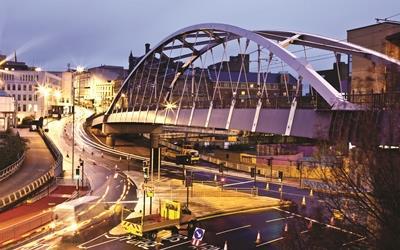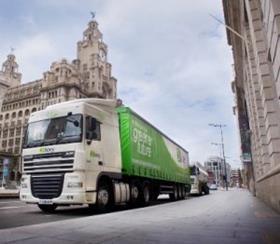
You might have heard the phrase ‘Northern powerhouse’ bandied about in recent days. Sadly, it does not refer to Sam Burgess or Kevin Sinfield, but more of a political ambition to turn the major towns in the north of England into an urban agglomeration akin to Germany’s Ruhr Valley.
At the heart of this proposal is, inevitably, transport. And to that end Transport for the North (TfN) has been created to create the first ever comprehensive transport strategy for the region, covering roads, rail, freight, airports and smart ticketing. Think Transport for London (TfL), but for Liverpool, Manchester, Leeds, Sheffield, Hull and even Newcastle.
Like it or loathe it, it is hard to levy an accusation that TfL has been bad for freight transport in London. Spearheading initiatives like CLOCS, FORS and out-of-hours deliveries has made the capital a safer and smarter place to deliver freight (even if the more mainstream media would like its readers to believe otherwise). TfN has a huge opportunity to do the same in one of the heartlands of logistics in the UK – the M62 corridor.
The accompanying press release (all revolutions are started with a press release these days) claims: “The government and TfN will work together to produce multi-modal freight and logistics strategy for the North, to help the private sector invest with confidence in ports and other freight centres.”
It is doubtful that you’d find many operators in the north of England disagreeing with that. Multi-modal operators are stronger outside of the south-east of England, because – for rail in particular -there is more capacity on the rails to move freight and not commuters. Its sea ports and airports are ripe for increased capacity, because there are no major international hubs, like Felixstowe and Heathrow are in the maritime and aviation worlds.
Freight on Rail states that the north of England is the origin or destination of over 40% of UK rail freight volumes, adding that: “Rail freight is an intrinsic part of the economy in the North of England transporting consumer products and bulk traffic such as coal, biomass, aggregates, steel and petrochemicals.”
But it’s not all about multi-modal. Roads in the north of England are, much like the rest of the UK, not fit for purpose and desperate for increased capacity.

The government (for they are that for the next six or seven weeks) promise to expand the M62 to four lanes between Leeds and Manchester, upgrade the M6 to four lanes, improve the A1 to provide continuous motorway standard between London and Newcastle and widen the M1 to four lane running in Yorkshire and Humberside. That means more efficiencies for road hauliers, improving productivity.
There is a blueprint for an interconnected urban agglomeration being wildly successful in Europe, and that is in Germany. The Ruhr valley, incorporating Dortmund, Essen, Duisburg, Gelsenkirchen and the like is Germany’s largest ‘city’ – or at least an area of 8.5 million people who share the same urban and economic development.
If TfN can bring together the cities of the north in the same way through efficient use of transport for freight and passengers alike – then that really will be a boon for the powerhouse hauliers of the north.











